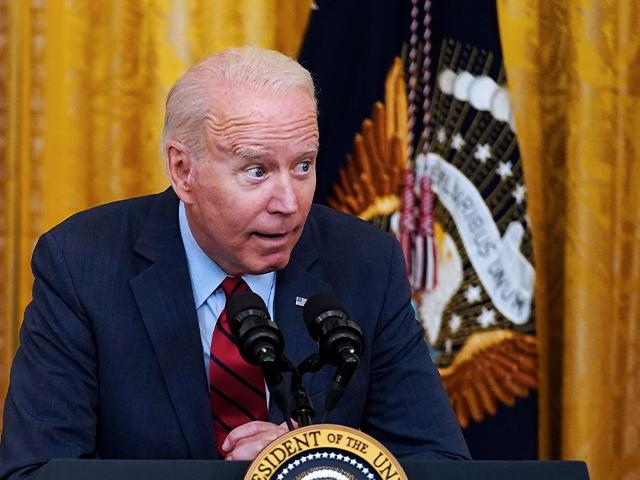'No Deal by Extortion!' GOP Furious Over Biden's Bait-and-Switch After $1.2 Trillion Bipartisan Infrastructure Deal
WASHINGTON – In a rare moment of bipartisanship, a group of Senate Democrats and Republicans struck a deal with the president on a plan to address America's infrastructure, however, within hours of the handshake the Commander in Chief and top Democrats announced conditions on the deal.
"We have a deal," President Biden announced as he walked out of the White House surrounded by a bipartisan group of senators.
With most of his top legislative priorities stalled on Capitol Hill, he announced he'd struck a $1.2 trillion deal on a scaled-back version of his infrastructure plan.
"None of us got everything we wanted. I clearly didn't get all I wanted, but this reminds me of the days we used to get an awful lot done up in the United States Congress," he explained to reporters.

President Joe Biden whispers into the mic in the East Room of the White House, June 24, 2021, in Washington. (AP Photo/Evan Vucci)
Meeting a key Republican demand, the plan does not raise taxes. Instead, it's paid for by unused COVID-19 relief funds and stepped-up IRS enforcement on tax cheaters.
"We've been talking about the need for a large infrastructure package for decades. Today we are delivering," said Sen. Susan Collins (R-ME).
The deal falls well short of the president's original proposal and liberal Democrats immediately demanded more.
"I think it is way too small. Paltry, pitiful, and I will insist on a second package that not only addresses more roads, bridges, and other tangible assets but also human infrastructure," complained Sen. Richard Blumenthal (D-CT).
And within hours the president made it clear he won't sign the bipartisan bill until Democrats pass a separate massive spending package that includes tax hikes and funds so-called human infrastructure like childcare in a bill that can be passed with only 51 Democratic votes in the Senate through a process called reconciliation.
"It was a tale of two press conferences. Endorse the agreement in one breath and threaten to veto it in the next, less than two hours. It almost makes your head spin," Sen. Mitch McConnell (R-KY) said on the Senate floor.
Sen. Lindsey Graham (R-SC) is also blasting the "bait-and-switch" move by Biden and the Democrats. "No deal by extortion! It was never suggested to me during these negotiations that President Biden was holding hostage the bipartisan infrastructure proposal unless a liberal reconciliation package was also passed," he tweeted.
I can’t imagine any other Republican had that impression.
— Lindsey Graham (@LindseyGrahamSC) June 25, 2021
I can’t believe the Biden Administration expects such an obvious bait and switch tactic – motivated by fear of the Left – to work in the Senate and be respected by the American people.
For her part, Speaker Nancy Pelosi offered an insurance policy to appease her base.
"There ain't gonna be no bipartisan bill, unless we are going to have the reconciliation bill," Pelosi told reporters.
However, for now, the current bipartisan bill meets Republican demands sticking to traditional infrastructure. It spends $109 billion on roads and highways, $65 billion on broadband, and replaces every lead water pipe in America.
"This bipartisan agreement represents the largest investment in public transit in American history and I might add the largest investment in rail since the creation of Amtrak," the president added with a nod to his preferred mode of transportation.
Still, many roadblocks stand ahead of the deal and final passage is far from guaranteed.
On a side note, social media has been abuzz since the press conference with many people wondering why Biden did so much whispering into the mic:




